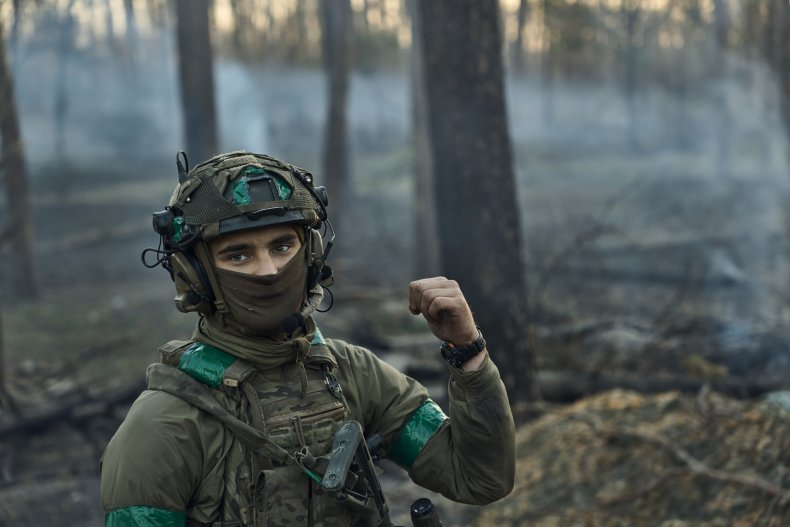DAVID BRENNAN
Russia's weakened military appears unable to deal with Ukraine's multi-theater offensive effort, according to a former commander of U.S. Army Europe, with Kyiv's varied attacks wreaking havoc in in southern Ukraine, Crimea, and even within Russian borders.
Retired Lieutenant General Ben Hodges told Newsweek in an interview that the "Ukrainian General Staff is running rings around the Russian General Staff" as both sides look to make gains before the mud and freezing conditions of fall and winter set in.
Recent months have seen an intensification of small drone attacks across western Russia, several even reaching Moscow and causing damage in the capital. Meanwhile, major strikes on occupied Crimea have become commonplace, as naval drones and advanced cruise missiles target key defensive and naval facilities.
All the while, Ukrainian troops in southeastern Ukraine have been pressing the counteroffensive that has been underway since early June. Kyiv's ground forces are yet to rend a decisive hole in Russia's defensive lines as they seek to collapse the so-called "land corridor" of occupied territory linking Crimea to western Russia.

A Ukrainian soldier is pictured while on maneuvers in the Kreminna Forest on September 24, 2023 near Kreminna, Luhansk region. Ukrainian forces have been on the offensive in the southeast of the country since June, while those in the northeast have been defending against a Russian attack.
The success or failure of the operation could prove decisive in shaping the war, with more skeptical observers citing the offensive's slow progress as a signal that the conflict is freezing over, perhaps necessitating fresh peace talks with the Kremlin.
Sevastopol Exodus
In Crimea and the Black Sea, at least, Kyiv is being buoyed by cascading successes. Ukrainian commandos have been raiding the peninsula and engaging Russian troops and facilities there, while other Ukrainian forces seek and destroy valuable radar and air defense sites protecting Crimea's strategic jewels.
Among those is Sevastopol, the home of the beleaguered Black Sea Fleet and the crux of Russian power on the peninsula. In past weeks, Ukraine—which has no conventional navy and a limited air force—has badly damaged two more Russian vessels, including a Kilo-class submarine, and destroyed the Black Sea Fleet headquarters.
Recent satellite images suggest the bulk of the fleet and the ships carrying Moscow's prized Kalibr cruise missiles have relocated out of Sevastopol. This is an apparent admission that Russian-occupied Crimea—sometimes referred to as Moscow's "floating aircraft carrier" in the Black Sea—is not as formidable as once thought.
"It remains to be confirmed, but if the Black Sea Fleet is having to leave Sevastopol now because they realize that they are so vulnerable to long-range precision weapons that they can't stay there, this is really impressive," Hodges—long a proponent of Ukrainian liberation of Crimea regardless of Western skepticism—said.
"But it also shows the benefit of having the long-range precision weapons that can hit the facilities at Sevastopol, the air base at Saki, the logistics hub at Dzhankoy."
Newsweek has contacted the Russian Defense Ministry by email to request comment.
Moscow has problems within its own internationally recognized borders, too. "You've got these drones that have been hitting targets throughout Russia," Hodges said. "Each of these causes the Russian commercial airports to have to shut down operations, which has an economic impact as well as psychological.
"And then we read about cyberattacks that are shutting down airports all over Russia. What you see is enormous pressure on the Russian General Staff and on their air defense systems."
Crimea or Bust
Crimea appears the ultimate strategic goal for Kyiv. President Volodymyr Zelensky has already vowed that the war will end in Crimea, the same place it began with the arrival of Moscow's "little green men" in 2014.
Western partners have expressed doubt given tactical challenges posed by liberating Crimea. Some have even warned that a Ukrainian attack on the peninsula might prompt a Russian nuclear escalation given its importance in President Vladimir Putin's neo-tsarist mythmaking.
But Kyiv appears undeterred. "There are no 'new territories of Russia' or 'annexed territories' and there is no chance that Russia will be able to retain control over them," Mykhailo Podolyak—an adviser to the head of Zelensky's office—wrote on social media last month. "There is only the territory of Ukraine, including Crimea."
Hodges has long been pushing Western partners—the White House in particular—to explicitly commit to the liberation of Crimea. "Part of the problem is that people just can't imagine that Russia could actually lose Crimea," he said.
"If you pick up a map and look at it, you see immediately why Crimea is the decisive terrain of the war. Ukraine will never be able to rebuild their economy as long as Russia occupies Crimea, because all of their ports on the Black Sea will be blocked or easily disrupted. That's unacceptable for the Ukrainians."

Lieutenant General (Retired) Ben Hodges (L) is pictured during GLOBSEC's 2023 Bratislava Forum in Bratislava, Slovakia on May 30, 2023. Hodges has repeatedly urged Western governments to send advanced precision weapons to Ukraine.
"They're not trying to push back along the whole line. They don't need to. Once Crimea has been liberated, the Russians don't care about Donbas except for the 'land bridge' part. They haven't done a thing in 10 years to improve one farm in that whole damn place."
Many of the most punishing Ukrainian strikes since mid-June—including those chasing the Black Sea Fleet out of Sevastopol—have relied on foreign technology. British-French Storm Shadow/SCALP cruise missiles in particular, have proved a serious challenge for the Russians.
Kyiv will need more advanced Western technology to keep up its offensive tempo. Recent political developments in the U.S. and European Union, though, raise the prospect that funds and arms might dry up if the war continues. Much will hinge on the U.S. presidential election next year, and on the ability of EU nations to supercharge military industries that appear anemic in the face of full-scale conflict.
"I try to focus on capability instead of specific platforms, because if you talk about specific platforms you can come up with all kinds of excuses," Hodges said, in a nod to the continued American and German refusals to provide the long-range MGM-140 Army Tactical Missile System and Taurus cruise missile, respectively.
"I don't care if these things are dropped by storks, the point is that if the Ukrainians have long range precision capability, they can hit every bit of the logistics, maintenance, refueling, ammunition in Sevastopol," Hodges said. "That's what Ukrainians are doing with a combination of drones and now Storm Shadow. Of course, you need a lot of these things."
"Whenever I heard somebody from the Pentagon say: 'The Ukrainians don't need those, they're not part of the offensive,' [I think] these are people that have no idea what they're talking about. They don't understand what the Ukrainians are trying to do. They're thinking very linearly. It's astounding to me."
No comments:
Post a Comment